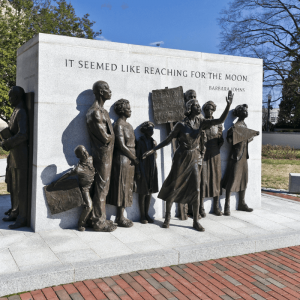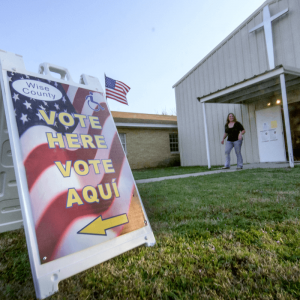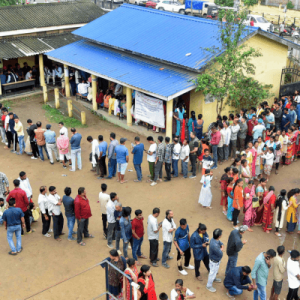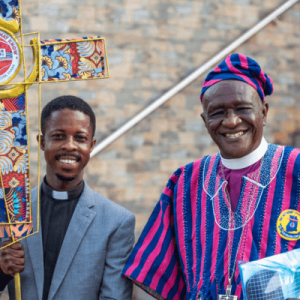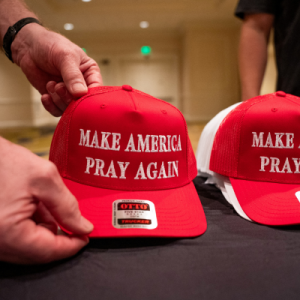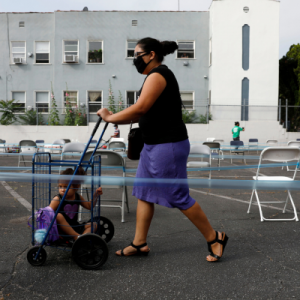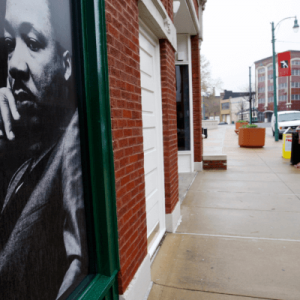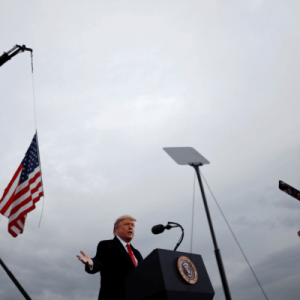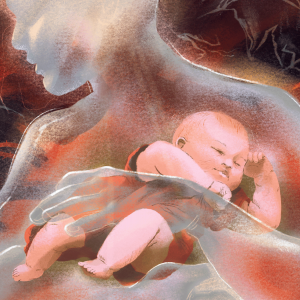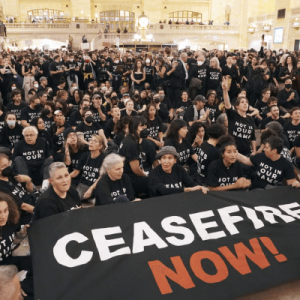
Rev. Adam Russell Taylor is president of Sojourners and author of A More Perfect Union: A New Vision for Building the Beloved Community. Follow him on Bluesky @revadamtaylor.
Taylor previously led the Faith Initiative at the World Bank Group and served as the vice president in charge of Advocacy at World Vision U.S. and the senior political director at Sojourners. He has also served as the executive director of Global Justice, an organization that educates and mobilizes students around global human rights and economic justice. He was selected for the 2009/2010 class of White House Fellows and served in the White House Office of Cabinet Affairs and Public Engagement. Taylor is a graduate of Emory University, the Harvard University Kennedy School of Government, and the Samuel DeWitt Proctor School of Theology. Taylor also serves on the Independent Sector Board, the Global Advisory Board of Tearfund UK, and is a member of the inaugural class of the Aspen Institute Civil Society Fellowship. Taylor is ordained in the American Baptist Church and the Progressive National Baptist Convention and serves in ministry at the Alfred Street Baptist Church in Alexandria, Va.
Speaking Topics
- Human rights and global poverty
- Racial justice
- Voting rights
- Climate justice
- Economic justice
- Immigration
- Peace and nonviolence
- His most recent book, A More Perfect Union: A New Vision for Building the Beloved Community
Speaking Format
- Virtual and in-person events, also available for preaching
Languages
- Fluent in English
Past Notable Events
- Tufts University’s Russell Lecture
- United Church of Christ General Synod Gathering Keynote
- Children’s Defense Fund Staff Retreat Keynote
- Parliament of the World Religions
- Christian Community Development Association Keynote Panel
Posts By This Author
Diversity, Equity, and Inclusion Is Embedded in the Bible
DEI is just one way we can repent of and repair the effects of the systemic sin of racism.
SINCE THE RECORD-BREAKING Black Lives Matter protests in 2020, we have witnessed a right-wing backlash against efforts to advance racial justice, exemplified by state and local laws to ban books and censor how we teach history. Diversity, equity, and inclusion (DEI) programs, especially those in the corporate world and higher education, are also increasingly vilified.
Of course, these attacks on DEI are just a repackaging of old grievances. I’ve written extensively about how the political right in the United States has long sought to win and maintain political power by inflaming white racial prejudice through a never-ending culture war. To counteract this, we need to make a more persuasive and forceful case for why DEI programs align with and advance our core faith and civic values.
Diversity, equity, and inclusion programs address inequities experienced by people from historically marginalized identities, whether based on race, gender, religion, sexual orientation, disability, or any other element of humanity used to exclude and disadvantage. A DEI framework expands an organization or institution’s focus beyond simply recruiting a more diverse staff or student body to include diligent attention to equitable policies, compensation, and opportunities. When equity and inclusion are added to the picture, organizations can better build a shared sense of belonging, possibility, and ownership. That should be reflected not just in an organization’s culture, but in its material realities, including wages and promotions.
Why Civil Rights Anniversaries Should Matter to Christians
You don’t have to be a civil rights history nerd to understand why these milestones matter today: In case you haven’t noticed, we’re currently in the midst of a major backlash against racial justice, including many of the rights and freedoms that inspired civil rights leaders. These include book bans, assaults on DEI programs, the Supreme Court’s decision to end affirmative action programs in higher education, and forestalled efforts to transform our justice system and end racialized police violence. These courageous actions taken by our predecessors aren’t just a milestone to celebrate with a nice speech and a historical plaque; these actions reverberate through time, offering us inspiration and resilience for the unfinished cause of freedom and justice.
Christians, Don’t Repeat the Lies About Trump’s Conviction

Demonstrators hold placards and flags outside the Manhattan criminal court following the announcement of Republican presidential candidate and former U.S. President Donald Trump's verdict in his criminal trial over charges that he falsified business records to conceal money paid to silence porn star Stormy Daniels in 2016, in New York City, U.S. May 30, 2024. REUTERS/Cheney Orr
I felt a sense of somber relief when I learned former President Donald J. Trump had been found guilty of 34 felony charges. Somber: It’s a sad moment when a former president is convicted of falsifying business records to cover up an alleged sexual encounter that could have hurt his presidential campaign in 2016 — a verdict that will inflame the deep divisions in our nation. Relief: This is a victory for the United States’ constitutional commitment that no one, not even a former president, is above the law.
A Commencement Speech for the Class of 2024
Class of 2024, you are indeed overcomers, but you’re also no strangers to grief, doubt, and other emotions we don’t often acknowledge in commencement addresses. As you accept your well-deserved diploma, I don’t need to tell you that you’re graduating in an unsettling time: uncertainty around the most consequential election of your (and my) lifetime, uncertainty around the future of our planet amid an accelerating climate crisis, and uncertainty as to the outcome of horrific and intractable wars in Gaza, Ukraine, Sudan, and so many other places. You may be uncertain about your job prospects, whether Social Security will remain solvent by the time of your retirement, or whether you will ever be able to afford a home in this overheated housing market. If you’re a Christian, you may feel uncertain about how you can stay in a faith that has so often been distorted from the gospel.
Christians Can Be Political Without Pledging Allegiance to Partisanship
The “how” of politics — engaging in ways that uplift civility, truthfulness, empathy, and integrity — still matters, particularly in a time in which our democratic norms and systems are being challenged. From a Christian standpoint, how we engage in politics should be rooted in the fruit of spirit, which in his letter to the Galatian church, the Apostle Paul describes as “love, joy, peace, forbearance, kindness, goodness, faithfulness, gentleness, and self-control” (Galatians 5:22-23). Obviously, these virtues are not the norm in our body politic. And while it’s easy to blame politicians, we must first remove the speck from our own eyes.
Global Christians Are Praying for U.S. Elections. Will We Pray for Theirs?
By the end of this year, more than 50 countries — representing half of humanity — will have held national elections. Thinking about this statistic as an American helps put my own anxieties about the U.S. presidential elections in greater perspective. As Americans, we can easily be insular and self-centered, thinking that our nation’s political situation is exceptional and that we don’t need to be aware of what is happening in other countries. At the same time, we can also be unaware of the ripple effect that our own elections have on the rest of the world.
Amid Real Disagreement, Christian Unity Still Matters
When I say “Christian unity,” what I mean isn’t “Christians should all just agree” or even “Christians should ignore our real differences in doctrine and tradition.” Instead, what I mean by “Christian unity” is that when we center our shared identity in Christ — notwithstanding our differences — we can generate trust and build relationships that bear real fruit, increasing cooperation within the church to address challenges in the world. And I say this knowing that there are often many good reasons why Christians are not unified, including differing views on issues that cut to the heart of our faith, such as our interpretation of scripture, what we believe about the role of baptism, and vastly different governance structures, as well as differing views around contentious issues such as abortion and sexuality. But Christian unity is still worth pursuing because it ultimately strengthens our collective witness, advancing the love of God and work of justice.
‘The Things That Make For Peace’
Celebrating the peace work of retired Sojourners editor Jim Rice.
WHEN THE PRECURSOR to Sojourners magazine, The Post-American, was founded in 1971, it was in large part as a Christian response to the Vietnam War. While Sojourners was also a countercultural community equally opposed to the evils of racism, sexism, and materialism, a commitment to peace and nonviolence has always been at the center of our work.
Very few people have embodied that mission more than Jim Rice, who recently retired from our staff after more than four decades of faithful and courageous service. Readers may know Jim best as a long-serving member of the editorial staff of Sojourners, including 16 years as the editor, a tenure marked by many best-in-class awards for the magazine. Yet Jim’s time at Sojourners was also defined by a commitment to peacemaking, both before and after he joined the magazine staff.
A ‘Nonconforming Minority’ Can Defeat Christian Nationalism
In his newest book, Jim Wallis addresses what far too many white pastors ignore: nationalism in the church and autocracy in politics.
Jim Wallis is one of the faith leaders who keenly understands the threat of growing nationalism in the church and autocracy in our politics — and the role that Christians must play in stopping it. In his newest book, The False White Gospel: Rejecting Christian Nationalism, Reclaiming True Faith, and Refounding Democracy, he aims to inspire and equip “all who can be persuaded to resist and help dismantle a false gospel that propagates white supremacy and political autocracy.”
A Spiritual Politics for Burnt-Out Christians
I have a testimony: At the end of last year, I felt an unshakable sense of dread about the 2024 elections and all that it could entail. This dread was accompanied by an acute feeling of burnout, fueled by my exhaustion with how broken and polarized our politics have seemingly become and how another election year would test both our faith and democracy. This burnout showed up in restless sleep, nagging fatigue, and a frustrating sense of déjà vu, all of which impacted my mental, physical, and spiritual health.
How My Faith Radically Changed What I Eat
“Eating is an inherently good activity,” writes Elizabeth Palmberg in the 2009 issue of Sojourners, “a channel of God’s goodness.” Eating is also an essential way for us to experience fellowship, build relationships, and share love. Yet eating can also be, as the Apostle Paul writes, an extension of our faithfulness: “So whether you eat or drink or whatever you do, do it all for the glory of God” (I Corinthians 10:31). And when I think about my diet, it’s hard to imagine how the overconsumption of meat — which so often exacerbates health problems and disproportionately contributes to climate change — can be to the “glory of God.”
Teaching My Black Sons They Are Beloved
Every morning, I drive my two sons, ages 11 and 13, to school. Normally these rides are mostly quiet as I listen to podcasts, and they watch something on their iPads. But this February, I told my sons we were starting a new tradition: Taking turns naming a figure of Black history and sharing why we believe that person was significant. To my surprise, my sons’ initial reticence quickly turned to enthusiasm. So far, we’ve talked about Louis Armstrong, Jesse Owens, Sojourner Truth, Thurgood Marshall, Rosa Parks, and Carter G. Woodson — the leader of the Association for the Study of Negro Life and History who established the second week of February to be “Negro History Week” to counterbalance the ongoing erasure of Black contributions in the U.S.
Something Progressive and Conservative Christians Agree On
This week the House voted with a resounding margin of 357 to 70 to pass a bill that includes support for low-income families with multiple children. If passed in the Senate, the “Tax Relief for American Families and Workers Act” will enhance the Child Tax Credit by expanding eligibility and adjusting payments for inflation, provisions that would benefit about 16 million children in families with low income, lifting 400,000 children above the poverty line.
A Gathering of the Global Church
As Christianity's center of gravity continues to shift away from the West, it is increasingly important to strengthen relationships with younger Christian leaders from the majority world.
INTERNATIONAL ADVOCACY FOR peace and justice has long been central to our work at Sojourners. We participated in the nuclear freeze movement, the anti-apartheid struggle, the sanctuary movement, and more recent efforts to achieve the United Nations’ Sustainable Development Goals, combat climate change, and end the wars in Ukraine and Israel-Palestine.
In April, I will travel to Accra, Ghana, for an important gathering of emerging Christian leaders from around the globe. Sojourners is one of several Christian organizations and church bodies that are collaborating under the auspices of a key ecumenical partner, the Global Christian Forum (GCF), to bring together a new generation of Christian leaders. We’re thrilled for the opportunity these leaders will have to share their faith stories and discuss the connections between Jesus and justice in their local, national, and international contexts.
The Bitter Irony of MLK Day
No Christian leader has influenced my faith and activism as much as Rev. Martin Luther King Jr. — but the day we devote to his legacy often leaves me frustrated. There’s a bitter irony in a nation that takes a day off to celebrate King’s life and work while that same nation is experiencing a deep backlash against racial justice.
Is a ‘Revisionist History’ of Jan. 6 Alive in Your Church?
According to recent polling from the Washington Post and the University of Maryland, Republicans are now “more sympathetic to those who stormed the U.S. Capitol and more likely to absolve Donald Trump of responsibility for the attack than they were in 2021.” The same polling found that Americans were now slightly less likely to believe that President Joe Biden’s win was legitimate and more likely to believe there was “solid evidence” of voter fraud.
I’m Tired of So-Called ‘Christian’ Family Values
If we followed gospel teaching, “pro-family” wouldn’t be short for anti-women and anti-LGBTQ policies.
I'M TIRED OF hearing politicians use “family values” as shorthand for a narrow and often misguided agenda. It is time to broaden and reclaim a truly pro-family agenda to protect and strengthen all families. Since at least the 1990s, the political and Religious Right have often claimed a monopoly on “family values.” Many Democrats have only exacerbated this trend with their reticence to frame their policies as pro-family. As a result, whenever we hear a politician talking about “family values” or “pro-family policies,” it’s shorthand for policies that restrict women’s autonomy or threaten LGBTQ+ rights.
Of course, outside of the world of politics, it’s obvious that people with widely divergent perspectives view the welfare of their family — whether biological, blended, or chosen — as the center of their lives. Protecting families should be a nonpartisan issue with bipartisan support, not another casualty of partisan extremism.
What would a holistic pro-family policy agenda require? As Christians, we have a responsibility for both the pastoral and political welfare of families. It is these intimate, human, familial relationships that generate our common good. True family values in politics should mean programs and policies that protect human dignity, help families thrive, and promote space for kids to grow and learn. As Christians, we stand for this kind of “family values” not to force our theological beliefs on others, but to stay faithful to scripture’s commands to love God and generously provide for our neighbors’ flourishing, protecting the most vulnerable regardless of whether they share our beliefs (see Matthew 22:36-40).
Christians, We Need To Believe Trump
In a televised interview this week with Sean Hannity of Fox News, former President Donald Trump initially refused to answer the question of whether, if elected in 2024, he would be a dictator or use his power to seek retribution for his political opponents. After Hannity pressed further, Trump said he would only be a dictator on “day one” of a new presidency; he did rule out political retribution. This should be shocking, but are any of us surprised? Trump is known for his lying and exaggeration. Nevertheless, we make a grave mistake if we don’t take Trump’s words seriously.
Jesus Had Adverse Childhood Experiences, Too
“It is profoundly significant that Jesus was born not in a secure, two-income household but to an unwed teenage mother.”
I’ll never forget the day my first son was born. Joshua was more than a week late, so my wife’s doctor wanted to induce labor. After a long day of waiting, the nurses convinced me to get a bite to eat because it was likely to be an even longer night. Minutes later, I got a frantic call that my wife, Sharee, was undergoing an emergency cesarean section because Joshua’s heart rate had suddenly plummeted, and his umbilical cord was wrapped around his throat. That day marked the beginning of my journey as a father, the most rewarding and demanding experience of my life. Joshua immediately became the center of our world, as though a huge part of my own heart were living and breathing outside of myself.
The love I feel for my sons is the closest I have felt to God’s unconditional love for everyone. I knew instinctively from the moment I first held my son in my arms that I would do everything possible to ensure that this tiny, fragile person, who was completely dependent on our care, was protected, loved, and able to thrive.
Dear Christians, Cease-Fire Is Not Surrender
Wars, by their very nature, often force people to choose sides and dehumanize the other side to justify violence. We’ve seen the dangers of this binary here in the U.S. as some student groups in support of Palestinian liberation have wrongfully praised or failed to condemn Hamas’ attacks, while some pro-Israeli groups (including many U.S. Christians) have failed to acknowledge the injustice of the ongoing occupation of Palestine and the severe death toll Israel’s response has inflicted on Gazan civilians. Yet while the powers of the world want us to take a side and declare ourselves fully (and exclusively) pro-Israeli or pro-Palestinian, Christian compassion must be freed from favoritism. As peacemakers, we must honor the image of God in every Israeli and every Palestinian.

